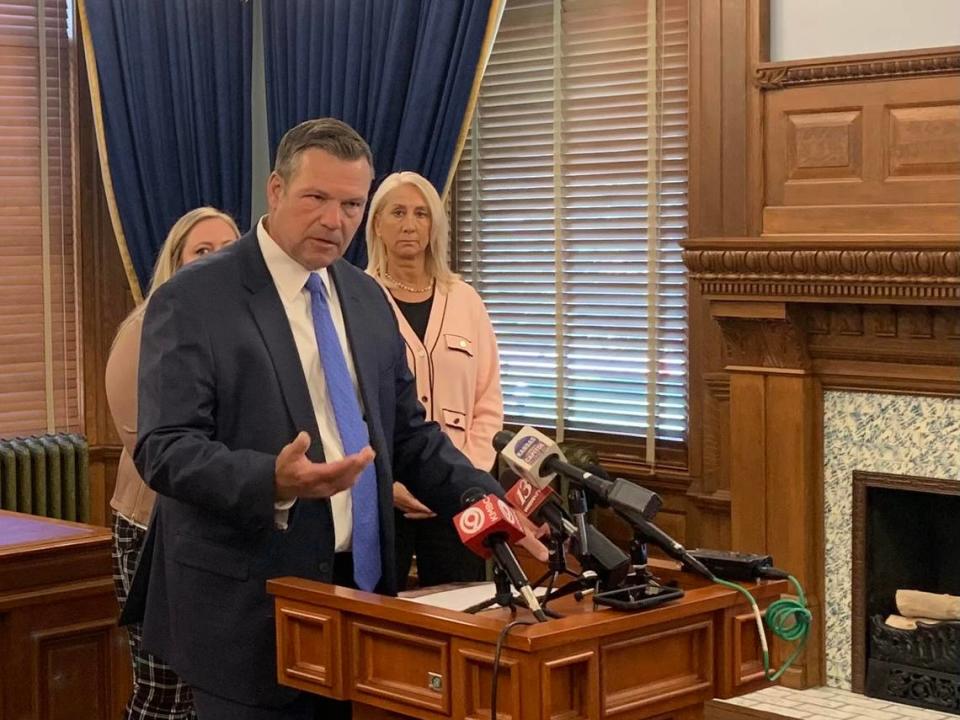Kobach sues Kelly admin to block trans Kansans from changing gender on driver’s licenses
- Oops!Something went wrong.Please try again later.
- Oops!Something went wrong.Please try again later.
Kansas Attorney General Kris Kobach filed a lawsuit Friday to block Democratic Gov. Laura Kelly’s administration from allowing transgender Kansans to continue to change their gender marker on driver’s licenses after a new law took effect last week.
In a motion of mandamus filed in Shawnee County District Court against the Kansas Department of Revenue, Kobach, a Republican, said Kelly was unlawfully ignoring SB 180, which defines man and woman in state law based upon sex assigned at birth.
In a legal opinion last week Kobach argued that the law, which went into effect Saturday, requires the Kansas Department of Revenue to stop allowing changes to driver’s licenses. Any documents that have already been changed, he argued, need to be reverted back to the individual’s sex assigned at birth. He reiterated that argument in the lawsuit.
“That law expressly requires that documents such as driver’s licenses reflect biological sex, i.e., sex at birth, and not a person’s chosen ‘gender identity.’ But the Governor announced she will not comply with the Women’s Bill of Rights and has instructed her subordinate agencies, including the Department of Revenue’s Division of Vehicles, to disregard it,” the lawsuit said.
“Someone must stand up for the law even if the Governor won’t,” it continued.
Kelly’s office announced last week that the governor had instructed state agencies to follow their own legal counsel, rather than Kobach, in determining how to respond to the law. KDOR and the Kansas Department of Environment, the administration said, opted to retain existing practices on gender markers.
By continuing to allow birth certificate changes, KDHE is staying in compliance with a consent judgment the Kelly administration reached in 2019 following a lawsuit by transgender Kansans in federal court.
Friday’s lawsuit sought a judgment forcing KDOR to stop allowing changes to gender makers and revert all its data back to sex assigned at birth.
The suit did not address birth certificates, though Kobach filed a motion last month asking a federal judge to modify the consent judgment to end the practice of allowing changes to birth certificates.
Kelly and Kobach both acknowledged in statements last week that SB 180 held no enforcement mechanism for its implications around single-sex spaces like bathrooms and locker rooms. As a result, both said, the new law would not impact policy around those spaces.
A spokeswoman for Kelly cast doubt that Kobach’s lawsuit would prevail, saying in a statement that the office looked forward to KDOR presenting it’s case in court.
“While the Attorney General has a well-documented record of wasteful and political lawsuits, Governor Kelly is faithfully executing the laws of the state and has directed her administration to as well,” said Brianna Johnson, Kelly’s spokeswoman.
Kara Ingelhart, an attorney with Lambda Legal who helped represent plaintiffs in the federal lawsuit which led to the consent agreement, said that to her knowledge no state has successfully stopped gender marker changes after they begin allowing them.
Ingelhart said Lamda Legal will challenge Kobach’s filing in the case that led to the consent agreement.
The Republican attorney general’s move to reverse gender marker changes, Ingelhart said, is “a mark of animus towards the community.”
The lawsuit marks the first major clash between Kelly and the attorney general since Kobach was elected last year.
Kobach, a hard right Republican, made his comeback to win statewide office as attorney general last year after losing to Kelly in the 2018 governor’s race and failing to make it out of the Republican primary for U.S. Senate in 2020.
As Kobach and Kelly fight over SB 180, trans people are left waiting to see whether Kansas will continue to officially, legally recognize their identities.
Republicans in the Kansas Legislature applauded Kobach for taking legal action.
“I don’t understand how the governor believes that she has the right to direct her agencies to ignore a law that went into effect July 1,” said Rep. Brenda Landwehr, a Wichita Republican who championed the bill.
Senate President Ty Masterson, an Andover Republican, said he had encouraged Kobach to “pursue aggressive action to ensure (Kelly) does not abuse her power and upholds her constitutional obligations.”
Jessica Hicklin is a formerly incarcerated trans woman in her 40s originally from Medicine Lodge in south central Kansas. Although Hicklin now lives in St. Louis, where she’s the vice president of Metro Trans Umbrella Group, a trans advocacy and educational organization based in the city, she holds a Kansas birth certificate.
Hicklin was one of four plaintiffs who sued the Kansas Department of Health and Environment in federal court in 2018 seeking to force the agency to issue updated birth certificates to trans residents who requested one.
At the time, Hicklin was serving a life sentence at the Potsoi Correctional Center in Missouri for a murder she committed as a 16 year old, but was freed in 2022 after the U.S. Supreme Court prohibited sentencing minors to prison without the possibility of parole. While in prison Hicklin successfully sued Missouri to provide hormone therapy.
In 2019, Hicklin and the other plaintiffs, represented by attorneys from Lambda Legal, reached a consent judgment with Kansas requiring state officials to provide new documents.
“When we fought the case originally, I was preparing to return to society and I was preparing to start a new life as the person I am,” Hicklin said in an interview with The Star last week.
“And everything I’ve built in my life is based on who I am and my identity and now I’m finding myself being questioned for that and having to do mental gymnastics about what part of my life is this going to change or am I going to be unsafe?”
Taryn Jones, a lobbyist for Equality Kansas, said the legal standoff created a sense of fear and uncertainty for transgender Kansans who do not know whether they’ll be able to keep a driver’s license that reflects their gender identity.
“All these people who had thought while I have until July 1 are now freaked out about it being retroactive,” Jones said.
Thomas Alonzo, who chairs Equality Kansas, said he didn’t expect Kobach’s suit to succeed and called it a waste of money. He referenced a case during Kobach’s tenure as Secretary of State in which a federal judge ordered him to take remedial law courses.
“It’s just so silly, we’ve got big big big problems in the state and transgender people are not one of them,” Alonzo said.



